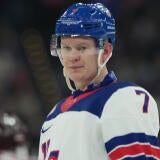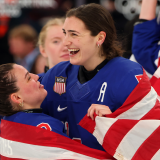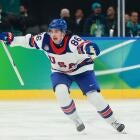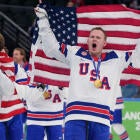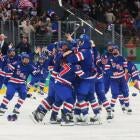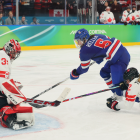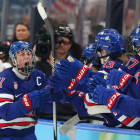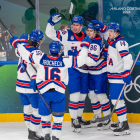2024 Paris Olympics men's basketball scores: Germany topples France as six of eight quarterfinalists confirmed
The last two spots are down to Serbia, South Sudan and Greece
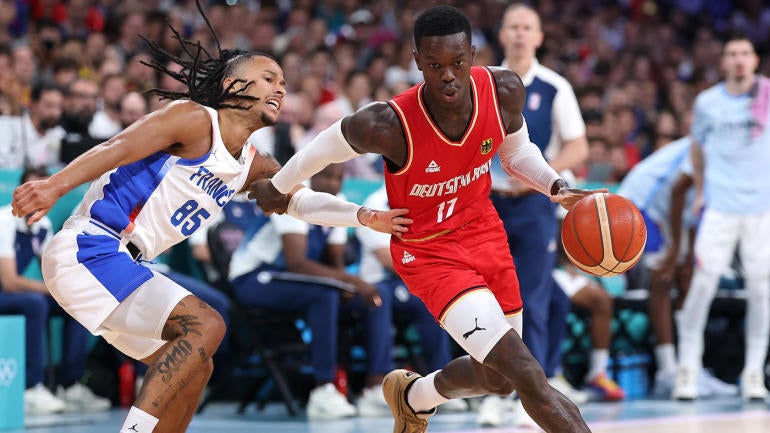
With an 85-71 victory over France on Friday, Germany joined Canada as the second team to go undefeated through group play so far. The United States can become the third with a win over Puerto Rico on Saturday.
Both Germany and France had already secured a spot in the quarterfinals, but the game still had meaning in that the winner would likely end up on the opposite side of the quarterfinal bracket from the United States, thus avoiding a potential matchup with the Americans until the gold medal game.
Why? Assuming the U.S. beats Puerto Rico on Saturday, three teams will be 3-0, and the top two point differentials will be the U.S. (+43 and counting) and Germany (+47). Canada finished its group with a +20 point differential.
Reminder: Eight teams qualify for the quarterfinals. The two top teams in each group and the two top third-ranked teams advance. Head-to-head competition breaks ties within groups, and point-differential competition breaks ties across groups.
With one day of group-play action remaining, six of the eight quarterfinalists have been confirmed: USA, Germany, Canada, France, Brazil (which beat Greece's point differential by a single point) and Australia. The Boomers advanced to the quarterfinals despite losing to Greece on Friday, finishing second in Group A thanks to Canada's win against Spain.
Spain, which actually could've won Group A with a win over Canada but instead finished last in the "Group of Death" with a loss, and Japan have been eliminated. Technically, Puerto Rico remains alive, but it would have to beat the United States by about 60 points and then still get help from Serbia or South Sudan. So Puerto Rico is out, too.
The two spots that remain up for grabs will come down to Greece, Serbia and South Sudan. Entering the Serbia-South Sudan game on Saturday, the point differentials look like this:
Serbia | +15 |
South Sudan | -6 |
Greece | -8 |
So you can start to do the math. If Serbia wins, it's in. If it wins by two or more, South Sudan is out and Greece is in. If South Sudan beats Serbia by 23 or less, or loses by one, South Sudan and Serbia are in while Greece would be out. The only way Serbia can blow this is to lose by 24 or more on Saturday. Probably not going to happen.
Add it all up, and in all likelihood, Serbia is in. Greece needs South Sudan to lose by two or more.
Friday's Olympic scores
Brazil 102, Japan 84
Greece 77, Australia 71
Canada 88, Spain 85
Germany 85, France 71
Schroder, Wagner star for Germany
Germany got 52 combined points from its two stars -- 26 each from Dennis Schroder, who added nine assists and five rebounds, and Franz Wagner, who threw down the dunk of the Olympics so far with a tomahawk jam in traffic late in the third quarter.
FRANZ WAGNER WITH THE DUNK OF THE OLYMPICS pic.twitter.com/758vQCa8Qq
— Global Hoops Daily (@worldhoopsfan) August 2, 2024
Wagner had his way getting into the paint and finishing at the rim, unfazed by France's twin-tower combo of Victor Wembanyama and Rudy Gobert. Schroder was once again terrific, hitting 10 of his 17 shots, including four of seven 3-pointers. The home crowd tried to push France, but Germany was too much.
France couldn't get into any sort of consistent offense. Wembanyama led the way with 14 points and 12 rebounds, but everything was a struggle. Germany controlled the defensive end and got out in transition throughout.
Canada conquers Group A
Shai Gilgeous-Alexander scored a game-high 20 points on 5-for-11 shooting for Canada, but split a pair of free throws with 16 seconds remaining, which led to a Sergio Llull 3-pointer that cut Canada's lead to just a single point. With 2.3 seconds left, Gilgeous-Alexander went to the free-throw line again and made both. Llull then missed a heave from beyond halfcourt at the buzzer.
Andrew Nembhard added 18 points on 8-for-10 shooting for Canada. RJ Barrett had 16 points on 6-for-10 shooting, including a clutch 3-pointer with 39 seconds left. Spain's Dario Brizuela scored 16 of his 17 points in the fourth quarter, including Spain's first 10 points of the period, but it wasn't quite enough.
Canada never trailed after taking a 22-21 lead early in the second quarter, but this one got dicey. Brizuela, who had scored just six points in the entire Olympics before the fourth quarter, produced one of the more magical individual scoring binges you'll ever see on this stage. He scored on four straight possessions early in the final frame, piling up 10 points in a less-than-two-minute span that got Spain within three points.
— SaDbo (@Sadbomary) August 2, 2024
Later, he hit a pull-up 3 over Lu Dort ...
— SaDbo (@Sadbomary) August 2, 2024
...and a hanging layup over Dwight Powell.
— SaDbo (@Sadbomary) August 2, 2024
Canada did not cruise to this victory, but its 3-0 record is a statement in itself. No one on Spain's roster could credibly stay in front of Gilgeous-Alexander, who, late in the second quarter, picked Llull's pocket near halfcourt and stuck his tongue out at his own bench en route to a two-handed dunk on the break.
— SaDbo (@Sadbomary) August 2, 2024
More than at any other point in his time with Team Canada, Nembhard looked like the guy who stepped up in Tyrese Haliburton's absence at the end of the Indiana Pacers' playoff run. Barrett made the biggest shot of the game, though, and, given how stellar he has been this summer, it was appropriate that he was the one cashing the corner 3 Canada desperately needed. The 88-85 final score was identical to the final score of the game between these two teams at the FIBA World Cup last year.
— SaDbo (@Sadbomary) August 2, 2024
"We found a way," Canada coach Jordi Fernandez said, via fiba.com. "When you don't have experience in this type of games and you don't know what this type of games mean, the only way to get experience is going through it. Now we have a group of guys that have gone through the World Cup, now the Olympics, and I think right now our experience is taking us to the next level. Very happy with my group, guys played in this pool that was extremely competitive. Being 3-0 is a great accomplishment."
If there is one main reason that Canada is 3-0, it is the team's defense. They are relentless at the point of attack, and, as commentator Dwyane Wade mentioned several times on the broadcast, Powell's pick-and-roll defense has been superb. Spain committed 15 turnovers on Friday, and Canada had a 21-6 advantage in points off turnovers.
"That is our identity," Nembhard said, via fiba.com. "We have a lot of guys who can switch and we are very versatile on that side of the floor and we can bring in new energy. When we are at our best, we are bringing our competitiveness to that side of the court."
Dillon Brooks added: "Our defense is our top thing, our ball pressure, our attention to detail, the way we help each other."
— SaDbo (@Sadbomary) August 2, 2024
Since Spain was eliminated, this game marked the end of Rudy Fernandez's sixth Olympics with the Spanish national team, an all-time record. The 39-year-old announced before the Olympics that these would be his last.
"I've been blessed, blessed to coach him," Spain coach Sergio Scariolo said, via fiba.com. "So many games, so many competitions. Seeing him never giving up. Never surrendering to the physical gaps he had at the three position against basically any opponent he had to face during his career. Being so competitive, being so committed to this team. No matter how his health was, no matter how his personal situation was. He was always there."
Fernandez's health wasn't optimal against Canada, following a hard hit to the head during Spain's game against Greece, but he still logged 15 minutes. Both he and Santi Aldama were game-time decisions leading up to the game.
"I'm extremely proud of the unbelievable effort of this team," Scariolo said, via fiba.com. "We were far away in the predictions, we were far away in the physicality, and the physical potential, but we found a way to compete until the very end. Unfortunately we got hurt, with two of our most important players Rudy Fernandez and Santi Aldama in bad physical condition, and it showed obviously during the game, but we always stayed in the game."
Aldama grabbed 11 rebounds, and Spain collectively rebounded 17 of its misses. Spain could only turn those extra opportunities into 14 second-chance points, though. With Canada forcing turnovers and making its first-shot offense incredibly difficult -- until Brizuela almost singlehandedly saved them, that is -- this was not enough.
Giannis, Greece beat Boomers
For much of the game, it looked like Greece was going to win in a blowout and punch its ticket to the quarterfinals. They started the second quarter on a 14-0 run, were up 53-36 at halftime and led by as many as 19 points in the third quarter, thanks largely to Australia's turnovers, which repeatedly led to easy buckets on the other end. Predictably, whenever Antetokounmpo managed to get near the restricted area, it was trouble for the Boomers.
— Chrissy (@chrissssyyymol) August 2, 2024
But Australia worked its way back into it. Matthew Dellavedova, who wasn't even in the rotation in the Boomers' Olympic opener against Canada, kickstarted an 8-0 run late in the third quarter, and Patty Mills, who has struggled from inside the arc throughout the tournament, capped a 9-2 run with a midrange pull-up to cut the deficit to just two points.
— Chrissy (@chrissssyyymol) August 2, 2024
"At halftime, and then the start of the third, it looked diabolical," Australia coach Brian Goorjian said, via fiba.com. "So if we did get through, the way we finished the game gives us a chance, and if we do go through, we go through from second place, which is a pretty good result from this pool."
Finishing second in the "Group of Death" is indeed an accomplishment, even if the Boomers lost two of their three games, committed 16 turnovers on Friday and had to root for Canada instead of determining its own destiny.
Greece came away with the win in part because Antetokounmpo got some help on offense. Thomas Walkup, the Stephen F. Austin legend, scored 18 points on 7-for-14 shooting, including a timely corner 3 that gave them a seven-point lead with about a minute left. Vasilis Toliopoulos and Dinos Mitoglou added 13 points apiece.
— Chrissy (@chrissssyyymol) August 2, 2024
"You just gotta give credit to all of the guys on the team," Antetokounmpo said, per fiba.com, "from [Kostas] Papanikolaou guarding; Walkup guarding and scoring the ball; Nick Calathes navigating every pick and roll; Mitoglou being able to cut, score and space the floor for us; [Georgios] Papagiannis playing strong, covering the rim, getting us rebounds and making it tough for everybody to get into the paint; shooters, Toliopoulos and [Dimitris] Moraitis, guys who came in, they were aggressive; [Panagiotis] Kalaitzakis, unbelievable defense in six minutes, he had three or four steals, you just gotta give credit to all of those guys. As a collective, we were able to come together and get a win tonight."
According to Vassilis Spanoulis, the iconic Greek player turned coach of the men's national team, they were "not disappointed" that they didn't win by a bigger margin. "This is a huge day for Greek basketball," Spanoulis said, via fiba.com. Since this is the team's first appearance at the Olympics since 2008 in Beijing, this is its first Olympic win since Aug. 18, 2008, against China, a game in which Spanoulis scored 19 points.
"I believe all teams deserve to go through from this group," Papanikolaou said, via fiba.com. "All of them played good basketball, had good and bad moments, sometimes you need a little bit of luck, also. Hopefully, luck will smile on us."
Two fun facts: Mills, who scored 13 points, now has 541 career points in the Olympics, which is the fifth-highest total in history (he surpassed Brazil's Wlamir Marques's total of 537) and 50 points shy of Argentina's Luis Scola for No. 4. Also, Antetokounmpo's total of 81 points in his first three games at the Olympics is the fourth-highest in history. (Luka Doncic's 85 points in his first three games at the Olympics for Slovenia is the all-time record.)
The Caboclo Show
Earlier on Friday, Brazil's Bruno Caboclo dominated Japan in a 102-84 victory. Ten years after he was drafted, the 28-year-old big man went off for 33 points on 13-for-19 shooting, 17 rebounds and a block in 30 minutes. Caboclo made all four of his 3-point attempts and nine of his rebounds were on the offensive glass.
The comfortable victory meant that Brazil finished third in Group B with a 1-2 record and a minus-7 point differential. The win didn't immediately mean Brazil would advance to the quarterfinals, but the result of the following game between Greece and Australia did.
In their first 2024 Olympic victory, Giannis Antetokounmpo and Greece beat Australia by a final score of 77-71. As a result, Greece finished third in the "Group of Death" with a minus-8 point differential.
Antetokounmpo scored a game-high 20 points on 8-for-11 shooting, with seven rebounds, six assists and two steals against the Boomers, who, like Greece, finished the group stage 1-2.
In early July, Caboclo was the MVP of the FIBA Olympic Qualifying Tournament in Riga, Lithuania, but he scored only six total points in Brazil's first two games of the Olympics, limited to 24 combined minutes against France and Germany because of foul trouble. Against Japan, though, he was by far the best player on the court.
"If he doesn't have foul trouble he gives so much to us at both ends of the court," longtime Brazilian point guard Marcelo Huertas said, via fiba.com. "He's a big threat on the 3-point line, in the low post, going to the basket. Defensively, he covers so much space and helps everybody."
Huertas added that "it's a whole different game" when Caboclo is on the floor. This was particularly true against Japan, which couldn't stop him or keep him off the offensive boards. According to fiba.com, Caboclo is the first player to record more than 30 points and 15 rebounds in a game at the Olympics since Clifford Luyk did it for Spain 52 years ago.
— Chrissy (@chrissssyyymol) August 2, 2024
Caboclo's best highlight might not have been any of his buckets, but a block against Yuta Watanabe in the fourth quarter. About a minute before that play, Japan was within two points of Brazil; about four minutes later, thanks to a 16-2 scoring run, Japan was down 96-82. Brazil limited Japan to four points in the last eight minutes.
— Chrissy (@chrissssyyymol) August 2, 2024
It was The Caboclo Show, but it wasn't just The Caboclo Show. Brazil shot an absurd 17 for 28 (60.1%) from 3-point range as a team (and made 12 of its first 14 attempts from behind the arc) and Huertas had 13 points and eight assists in 23 minutes.
"Today we were really good as a team," Caboclo said, per fiba.com. He added that, since he avoided foul trouble, he was able to make a difference: "If I can stay on the court, I think I can impact things. With my offensive ability, I can help the team a lot. Even if I am not doing well on offense, I can impact the defensive end of the floor with my wingspan."
Rui Hachimura, who scored 24 points in 28 minutes against France on Tuesday before being ejected for committing two unsportsmanlike fouls, did not play for Japan. Japan's basketball federation announced early Friday that Hachimura had left the team because of a calf injury.
Japanese guard Yuki Kawamura, one of the breakout stars of these Olympics, had 21 points on 7-for-19 shooting, gave Brazil some trouble with his speed and made a couple of memorable stepback 3s. He and forward Yuta Watanabe, weren't particularly efficient, finishing with a combined 35 points on 13-for-36 shooting. Center Josh Hawkinson, however, was incredibly efficient -- he knocked down five of his six 3-point attempts and scored a team-high 26 points on 8-for-13 shooting.
Yuki Kawamura is incredible. Dances and nails the stepback triple pic.twitter.com/UHJSdMkc3F
— Global Hoops Daily (@worldhoopsfan) August 2, 2024
Japan shot 16 for 41 from deep collectively. According to fiba.com, this was the first time in Olympic history that both teams made at least 15 3-pointers.


